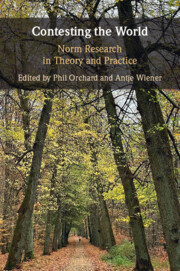Book contents
- Contesting the World
- Contesting the World
- Copyright page
- Contents
- Figures
- Tables
- Contributors
- Acknowledgements
- Abbreviations
- 1 Introduction
- Part I Norm Strength, Collisions, and Conflicts
- Part II Development of the Field
- Part III Meta-theorising, Linkages, and International Law
- Part IV Dimensions of Norm Contestation
- References
- Index
1 - Introduction
Norm Research in Theory and Practice
Published online by Cambridge University Press: 01 November 2024
- Contesting the World
- Contesting the World
- Copyright page
- Contents
- Figures
- Tables
- Contributors
- Acknowledgements
- Abbreviations
- 1 Introduction
- Part I Norm Strength, Collisions, and Conflicts
- Part II Development of the Field
- Part III Meta-theorising, Linkages, and International Law
- Part IV Dimensions of Norm Contestation
- References
- Index
Summary
Over the past three decades norms research has become a subfield that matters beyond the boundaries of International Relations (IR). Like other such generative processes this subfield’s path is marked by debates over conceptual and methodological preferences. This book argues that irrespective of how we understand these divides, the critical question for today’s norms researchers is how have our understandings of norms developed over this period? To address this question this book brings together a range of junior, mid-career, and senior scholars, working at the leading edge of norm research, across a diversity of issues and subfields, and using different epistemological perspectives. Two lenses feature in this endeavour: the first considers the history of norm research as a series of three distinct and theoretical moves, and the second examines the potential of practices of interpretation and contestation (which we term the ‘interpretation-contestation framework’) as a way of bringing together a range of theoretical tools to understand norm change, evolution, and replacement. In short, this book focuses on the past trajectory of the field to argue that norm research continues to hold significant potential and promise for theorising within IR and studying current issues and problems.
Keywords
Information
- Type
- Chapter
- Information
- Contesting the WorldNorm Research in Theory and Practice, pp. 1 - 26Publisher: Cambridge University PressPrint publication year: 2024
Accessibility standard: Unknown
Why this information is here
This section outlines the accessibility features of this content - including support for screen readers, full keyboard navigation and high-contrast display options. This may not be relevant for you.Accessibility Information
- 1
- Cited by
